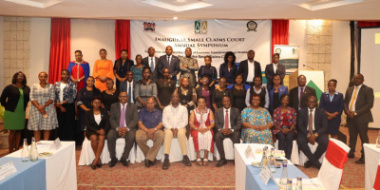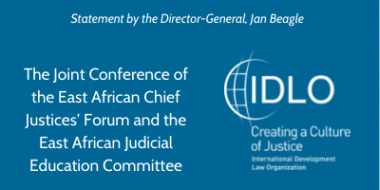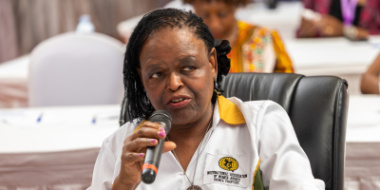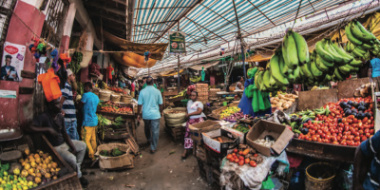
African high-level jurists, experts and legal scholars are meeting in Nairobi for the East Africa Regional Forum on Alternative Dispute Resolution & Customary and Informal Justice, organized by IDLO, the International Commission of Jurists (ICJ) and the Judiciary of Kenya.
The Forum got underway with an address by the most prominent member of the Kenyan judiciary, the Chief Justice and President of the Supreme Court of Kenya, David Maraga.
Chief Justice Maraga told the delegates: “We are delighted as a Judiciary to be co-hosts of this important conversation. We are even more delighted to be co-hosting this Forum with our two erstwhile and dependable partners in the administration of Justice: the International Development Law Organization (IDLO) and the International Commission of Jurists (ICJ). There can be no more fitting partners.”
“The Judiciary [of Kenya] has undertaken many initiatives and innovations in advancing access to justice in the past decade with the solid cooperation and collaboration of these two organizations. We are happy to diversify and deepen our conversations about alternative dispute resolution and alternative justice systems through this Forum,” the Chief Justice said.
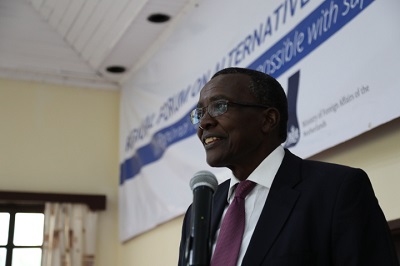 |
"We are happy to diversify and deepen our conversations about alternative justice systems through this Forum." - Chief Justice and President of the Supreme Court of Kenya, David Maraga
“In Sustainable Development Goal 16, the world – through the United Nations – finally acknowledged that access to justice is a prerequisite to sustainable and inclusive development,” Chief Justice Maraga underscored, adding that “SDG 16 makes it clear that there can be no sustainable development unless the society has strong institutions. This, naturally, includes institutions for promoting access to justice and the sharing of prosperity. Hence, what SDG 16 does is to put access to justice at the center of the conversation about sustainable development.”
The Chief Justice emphasized that there is an explicit recognition that other systems and methods of dispute resolution may be more appropriate for some disputes for some people. “Like SDG 16, the Constitution of Kenya now requires the Judiciary, and the State, to promote these other forms of dispute resolution,” he told the Forum.
Chuma Himonga is a Zambian law professor whose main fields of work are African customary law and comparative African family law, including customary marriages, marriages under received systems of law, the law of succession and children’s rights. Her main focus is legal pluralism. Speaking to IDLO at the Forum, she offered an insight into how customary African justice has fared under state law systems, and how these two interact with each other.
“We are talking about the natural evolution of the customary justice systems. But when they are supported to dispense justice, when they are recognized as dispensers of justice, and given a free hand to develop the customary laws that they are applying, without constricting them in procedural terms that may not necessarily reflect what is going on on the ground, I think they can adapt,” she said.
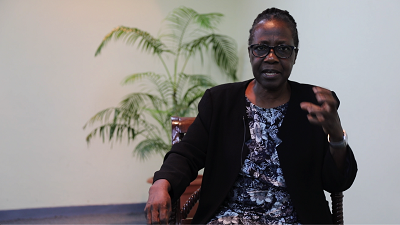 |
“We are talking about the natural evolution of the customary justice systems." - Zambian law professor Chuma Himonga
Professor Himonga gave an example from her decades-long research in the local courts of Zambia, where the appointments to sit as justice are dependent on the knowledge of customary law:
“These local court justices are obviously much closer to the local community than the professionalized magistrates and the superior court judges. In matters relating to the distribution of property after the dissolution of marriage, those courts – as early as in the 1980s – were making orders for men to share the matrimonial property, including houses, with their divorced wives, on the ground that these women were also contributing directly or indirectly to the activities that led to the acquisition of those properties. When those matters went on appeal to the subordinate courts, all of them were quashed by the professional magistrates, on the grounds that they were contrary to customary law. When they go to the higher courts, to judges that are trained in Western law and who are not trained in customary law, they think that these [customary] courts are not doing the right thing and therefore they need to be controlled by quashing their decision.”
Professor Himonga thinks that if traditional justice systems are given some freedom to make decisions that reflect what is happening on the ground, where they are, they are able to catch up with notions of justice that are in accordance with the lived realities of the people.
Despite these findings, Professor Himonga sees a positive development: “Of course, I am not saying that these [customary] justice systems are absolutely pure, that they will always make decisions that are compatible with human rights. Like every other system, they produce good and bad decisions. But I am saying that given the opportunity to reflect the living norms, and these justice systems apply living norms of customary law as practiced by the people, and if we continue to enhance the living norms of customary law that are positive and can contribute to the protection of human rights, then yes, this is positive development. But we need to empower and capacitate these justice systems.”
For more information, read the Regional Forum Report, available for download below.
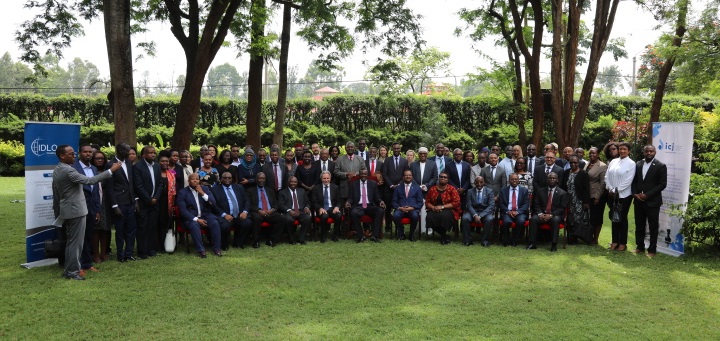 |



